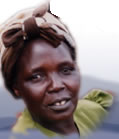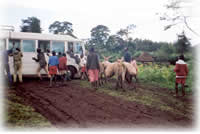 |
 |
||
 |
|||
|
RELATED THEMES development social change social relationships OTHER LOCAL THEMES BACKGROUND |
communications
Despite this, travel seems to have been on the increase in recent years, with some going as far as Nairobi or Mombassa for business or educational purposes. While at least one narrator believes travel can expose people to useful new ways of doing things - ".if you travel, you can get ideas from somewhere else" (Kenya 6) - others lament the decline in Sabaot traditions because of the increasing influence of the outside world. One belief, for example, is that the growing trend among young people to marry whom they want, without their parents' consent, is the result of them increasingly attending schools and universities outside the area. Radio is an important means of communication, several people talking about its capacity to broaden people's knowledge of the outside world, as well as its entertainment value. One narrator, though, feels the 'modern' music it has brought into people's lives has led to the decline of Sabaot traditional songs and dances. This tension between preserving a strong cultural identity yet being open to learning from others is a common thread in the testimonies. The Sabaot feel that they are isolated physically, economically and politically from mainstream Kenya, and that this severely limits their development options. Many recognise that contact with others can bring new ideas, wider experience and positive influences. Yet, perhaps because their relationship with the Bukusu also brought oppression, many talk of ridding the area of non-Sabaot, express distrust and disapproval of modern influences and fear the loss of old traditions. Finding a balance between preserving the strengths of their old way of life without being excluded from the benefits of modernisation is proving difficult, as it does for many culturally distinct groups. quotes about communications"[People appreciate the radio] as it enables them to know what's happening in other countries and even how people from different districts like Transzoia live....They come to learn about development matters, like the women development presented in Mombassa on the radio....It helps in educating people, entertaining during music time when one is bored....You also learn more about other countries, and so a radio is very important to them" "It is donkeys that transport [the farmers'] products, like Irish potatoes, vegetables, maize from the mountain, down the slopes...Some bring goods using donkeys here on market days because vehicles are never seen there...Donkeys are a common means of transport since our roads are in bad condition. Those sides are rocky and mountainous and the Matatu people can not reach there." "Sabaot also want good roads constructed for them because these days we are farmers but we've no roads for taking our produce to markets. Take for instance Chepkoya village (where he lives)-there is no road. Here in Mount Elgon also we even don't have a single tarmacked road from here to Cheptais." |
|
 The region's poor transport infrastructure is one of the most frequently cited causes for underdevelopment. It is seen to have a particular impact on health care, access to facilities being so limited, and on economic growth: markets are only reached with difficulty and expense; vehicles cannot be used on all routes. Many different people complain about it, from a farmer who talks of problems selling his produce, to a school teacher who describes being covered in mud by the time she gets to school every morning. The first roads in Mount Elgon were constructed under the colonial government, and many feel let down by the subsequent governments' failure to improve the infrastructure.
The region's poor transport infrastructure is one of the most frequently cited causes for underdevelopment. It is seen to have a particular impact on health care, access to facilities being so limited, and on economic growth: markets are only reached with difficulty and expense; vehicles cannot be used on all routes. Many different people complain about it, from a farmer who talks of problems selling his produce, to a school teacher who describes being covered in mud by the time she gets to school every morning. The first roads in Mount Elgon were constructed under the colonial government, and many feel let down by the subsequent governments' failure to improve the infrastructure.